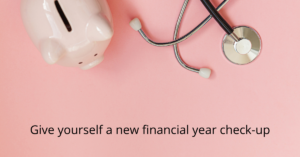 While it’s impossible to anticipate future changes to the global economy, there’s plenty you can do to help prepare your personal finances for an unpredictable future. A new financial year is a great time for a check-up and to set yourself new financial goals.
While it’s impossible to anticipate future changes to the global economy, there’s plenty you can do to help prepare your personal finances for an unpredictable future. A new financial year is a great time for a check-up and to set yourself new financial goals.
Know your current financial position
The best way to know where you’re headed is to understand exactly where you are. Getting a clear financial picture of your current position – even if it’s one that you’re hoping to improve – is key to unlocking a financial future that you can control.
Start by totalling your monthly expenses and looking at your income. By looking at these two things in detail, you might uncover some unnecessary costs that could be trimmed from your budget. One of the quickest ways to do this is with an automated budget tracker, which automatically tracks and organises all your spending into relevant categories.
Don’t forget to look at your liabilities, too. How much is your credit card debt? Do you have a car loan that’s eating into a possible savings plan and stopping you from achieving your long-term financial goals?
If you have similar information about your finances from last year, use this time to make an annual comparison of your income, expenses and liabilities. Maybe you’ve done better than you think, in which case, it’s cause for celebration. If not, you’ll have an idea of how much you need to recoup or alter in order to improve your situation this year.
Once you’ve got a grasp of your starting position, don’t just forget about it. Keep it somewhere you can refer back to this time next year – or even more frequently – to measure your progress.
Shift your mindset around money
Although we tend to think of money in dollars and cents, there’s a significant psychological component to personal finance. Recent research has found that 81 % of Australians ‘comfort spend’ to try to improve their mood; this is a staggering combined total of $25.5 billion a year.
In addition to simply crunching the numbers, it’s worth taking a closer look at your mindset around money. Renowned psychologist Carol Dweck has spent decades exploring the importance of embracing a ‘growth mindset’, an approach that honours effort and perseverance in reaching goals, as opposed to the ‘fixed mindset’, which suggests our circumstances are unchangeable because our traits are predetermined.
What does this have to do with your money? Dweck’s research suggests we can stay motivated by focusing on what is within our control: knowing that the changes we implement have a real effect on the outcome constitutes a growth mindset and is more likely to serve us in planning our financial future.
Focus on what you can control
Some spending, such as utility bills and groceries, are inevitable and a necessary part of life. But it’s still possible to focus on those things that are within your control, linking back to Dweck’s research. For example, you could take some time to research ways to save money and switch to a cheaper energy plan, purchase home-brand groceries rather than more expensive options or wait for certain items to go on sale.
Alternatively, you could commit to a more conscious approach to purchasing, such as mindful spending, as a way of curbing expenses and heightening awareness of where your money is heading. Try the seven-day rule as an easy way to cut down on impulse purchases and gain more control over every dollar in your budget.
Make clear plans
Getting clear on a plan for the future is a great way to achieve objectives for the financial year ahead. Setting goals that fall under the SMART category (that is, they are specific, measurable, attainable and realistic goals that adhere to a timeframe) is a popular way to approach your financial objectives. Some studies have found a 76% success rate for those who write their SMART goals down.
You could also try the ‘if-then’ strategy, which links a certain outcome with actionable behaviour. For example: ‘if I don’t pay off my credit card by November, I’ll stop buying my morning coffee for a month’. People who implement this strategy are up to 300% more likely to tick things off their list.
Celebrate your financial success
A common problem with the concept of a budget is that it seems prohibitive. It’s all about what you can’t spend, which can have a negative connotation. Switch things up and make an effort to celebrate those times when you’ve made strides in your financial situation, whether it’s paying off debt or getting closer to that savings goal.
Keeping track of your starting position at the outset of the financial year can also help with this as you can measure your progress and goals in facts and figures.
For more information, book a time to chat here and let’s discuss what’s best for you.
Source: AMP
